30 Inspiring George MacDonald Quotes
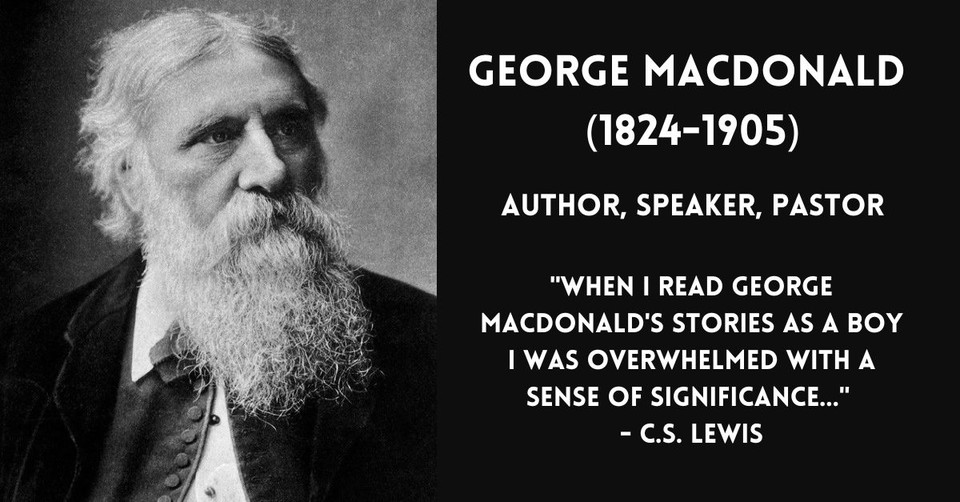
George MacDonald (1824-1905) may be one of his period’s most underappreciated writers. During his life, MacDonald was a preacher (and pastor for a short time), public speaker, professor of literature, and author of fantasy stories, novels, and literary criticism. He knew or corresponded with many well-known authors and was a personal friend of Lewis Carroll. Many have called MacDonald the grandfather of modern fantasy literature.
While many of MacDonald’s books went out of print after his death, he greatly influenced Christian authors like G.K. Chesterton and Frederick Buechner. C.S. Lewis credited reading MacDonald’s Phantastes as a vital step in his journey from atheism to Christianity. Other members of the Inklings (including J.R.R. Tolkien and Charles Williams) also read MacDonald’s work. Later writers who have cited MacDonald’s influence include Madeleine L’Engle and Andrew Peterson.
While literary tastes have changed since his time, MacDonald had many ideas in his work that are still worth exploring. Here are some quotes from his many writings.
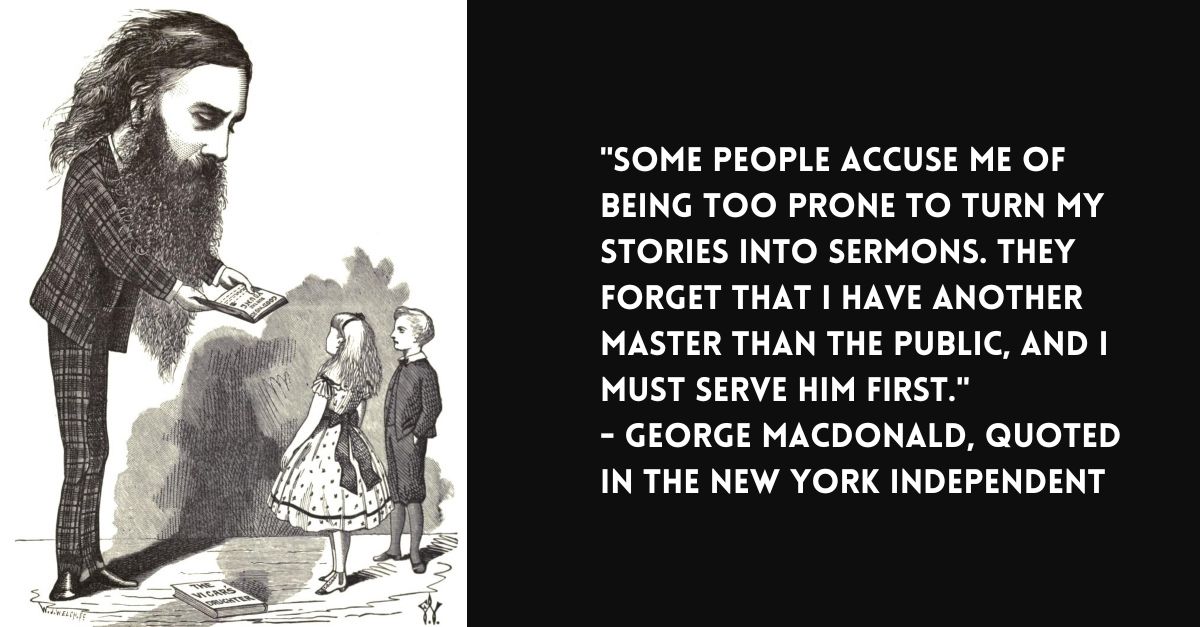
10 Inspiring Quotes from George MacDonald’s Sermons
While MacDonald only pastored a church for 28 months, he preached throughout his life at various churches. Like pastor and novelist Walter Wangerin Jr., MacDonald was a writer who never really abandoned his passion or vocation for preaching. Here are some great quotes from his sermon collections. Unless otherwise noted, all sermons are from MacDonald’s book Unspoken Sermons, Vol. 1-3).
1. “What is the kingdom of Christ? A rule of love, of truth—a rule of service. The king is the chief servant in it.” — “The Child In the Midst”
2. “Our God, we will trust thee. Shall we not find thee equal to our faith? One day, we shall laugh ourselves to scorn that we looked for so little from thee; for thy giving will not be limited by our hoping.” — “The Higher Faith”
3. “To understand the words of our Lord is the business of life. For it is the main road to the understanding of The Word himself. And to receive him is to receive the Father, and so to have Life in ourselves. And Life, the higher, the deeper, the simpler, the original, is the business of life.” — “The Heart with the Desire”
4. “… to Nazareth he comes with the sweetest words of the prophet of hope in his mouth—good tidings of great joy—of healing and sight and liberty; followed by the godlike announcement, that what the prophet had promised he was come to fulfill. His heart, his eyes, his lips, his hands—his whole body is full of gifts for men, and that day was that scripture fulfilled in their ears.” — “Jesus and His Fellow Townsmen” in The Hope of the Gospel
5. “So long as we have nothing to say to God, nothing to do with him, save in the sunshine of the mind when we feel him near us, we are poor creatures, willed upon, not willing; reeds, flowering reeds, it may be, and pleasant to behold, but only reeds blown about of the wind; not bad, but poor creatures.” — “The Eloi”
6. “Every highest human act is just a giving back to God of that which he first gave to us.” — “The Hands of the Father”
7. “When once to a man the human face is the human face divine, and the hand of his neighbor is the hand of a brother, then will he understand what St Paul meant when he said, ‘I could wish that myself were accursed from Christ for my brethren.’” — “Love Thy Neighbor”
8. “All the dangers of Jesus came from the priests, and the learned in the traditional law, whom his parents had not yet begun to fear on his behalf. They feared the dangers of the rugged way, the thieves and robbers of the hill-road. For the scribes and the Pharisees, the priests and the rulers—they would be the first to acknowledge their Messiah, their king! Little they imagined, when they found him where he ought to have been safest had it been indeed his father’s house, that there he sat amid lions—the great doctors of the temple!” — “Jesus in the World” in The Hope of the Gospel
9. “ Nor will God force any door to enter in. He may send a tempest about the house; the wind of his admonishment may burst doors and windows, yea, shake the house to its foundations; but not then, not so, will he enter. The door must be opened by the willing hand, ere the foot of Love will cross the threshold.”— “The Cause of Spiritual Stupidity”
10. “To save a man from his sins, is to say to him, in sense perfect and eternal, ‘Rise up and walk. Be at liberty in thy essential being. Be free as the son of God is free.’ To do this for us, Jesus was born, and remains born to all the ages.”— “Salvation from Sin” in The Hope of the Gospel
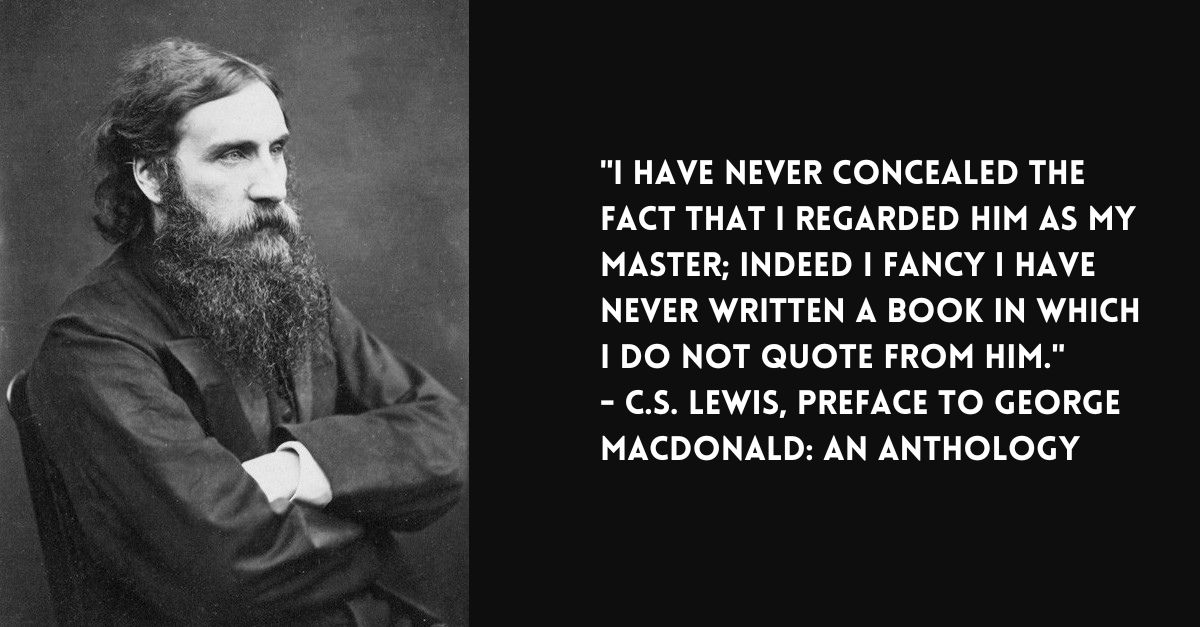
10 Inspiring Quotes from George MacDonald’s Nonfiction
Much of MacDonald’s writings about God and faith are contained in his sermons. However, he also wrote a religious study on Jesus’ miracles, and frequently discussed theology in his letters. Here are some of MacDonald’s insights into faith from sources.
1. “The imagination of man is made in the image of the imagination of God. Everything of man must have been of God first; and it will help much towards our understanding of the imagination and its functions in man if we first succeed in regarding aright the imagination of God, in which the imagination of man lives and moves and has its being.” — “The Imagination: Its Functions and Its Culture”
2. “There are far harder things to believe than the miracles. For a man is not required to believe in them save as believing in Jesus.” — The Miracles of Our Lord
3. “I can hardly say I have any fear, and but very little anxiety about the future. Did not Jesus say, Consider the lilies? We have only to do our work…” — 1853 letter to his father
4. “With all sorts of doubts I am familiar, and the result of them is, has been, and will b, a widening of my heart and soul and mind to greater glories of the truth—the truth that is in Jesus…” — 1886 letter to a reader
5. “For God will not compel the adoration of men: it would be but a pagan worship that would bring to his altars. He will rouse in men a sense of need, which shall grow at length into a longing; he will make them feel after him, until by their search becoming able to behold him, he may at length reveal to them the glory of their Father.” — The Miracles of Our Lord
6. “I believe in nothing but Jesus Christ, in whom are all the mysteries of reality.” — 1884 letter to Charlotte Powell Godwin
7. “The Lord of gladness delights in the laughter of a merry heart.” — The Miracles of Our Lord
8. “It is the human we love in each other—and the human is Christ.” — Beautiful Thoughts from George MacDonald
9. “One difference between God’s work and man’s is, that, while God’s work cannot mean more than he meant, man’s must mean more than he meant. For in everything that God has made, there is layer upon layer of ascending significance; also he expresses the same thought in higher and higher kinds of that thought: it is God’s things, his embodied thoughts, which alone a man has to use, modified and adapted to his own purposes, for the expression of his thoughts; therefore he cannot help his words and figures falling into such combinations in the mind of another as he had himself not foreseen, so many are the thoughts allied to every other thought, so many are the relations involved in every figure, so many the facts hinted in every symbol.”— “The Fantastic Imagination”
10. “In like manner, with divine differences, God began to talk to us ages before we were born: I will not say before we began to be, for, in a sense, that very moment God thought of us we began to exist, for what God thinks of, is. We have been lying for ages in his heart without knowing it. But now we have begun to know it. We are here, with a great beginning, and before us an end so great that there is no end to it.” — “A Letter to American Boys”
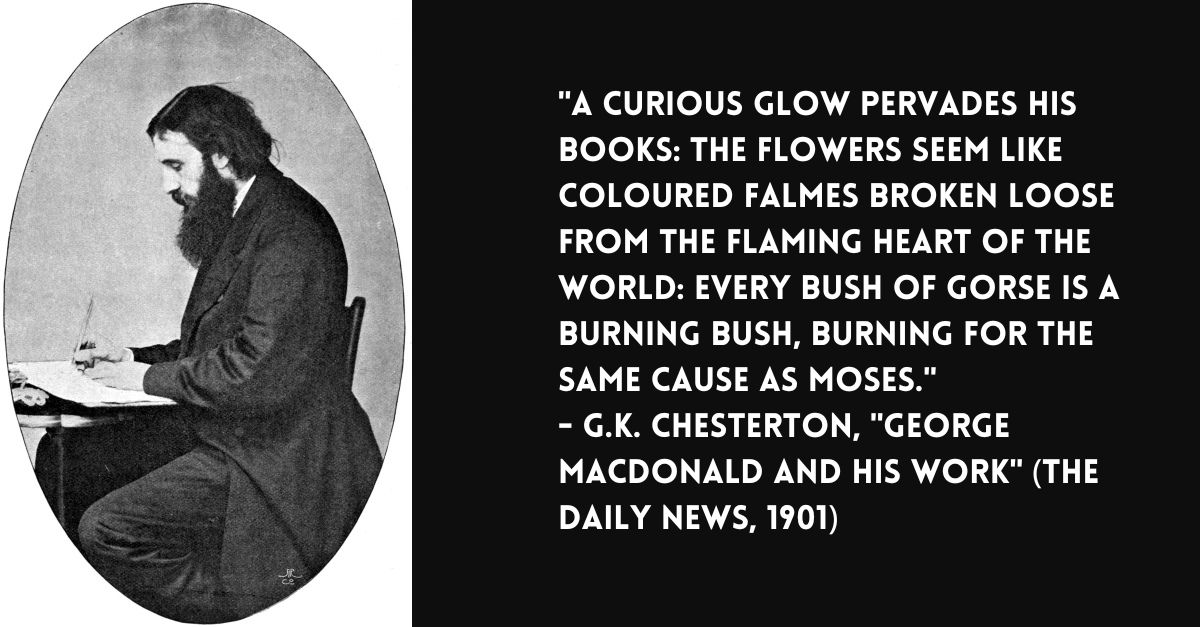
10 Inspiring Quotes from George MacDonald’s Fiction
Most readers first discover MacDonald through his fairy tales, but he also wrote many realistic novels. Here are some of the great religious ideas conveyed in his novels. Each quote lists the character saying the quote and the book it’s from.
1. “Mammon, you know, means riches. Now riches are meant to be a slave—not even the servant of man, and not to be the master. If a man serve his own servant, or, in a word, anyone who has no just claim to be his master, he is a slave. But here he serves his own slave. On the other hand, to serve God, the source of our being, our own glorious Father, is freedom; in fact, is the only way to get rid of all bondage.” — Henry Walton in Annals of a Quiet Neighborhood
2. “And if we believe that our God is everywhere, why should we not think Him present even in the coincidences that sometimes seem so strange?” — Henry Walton in Annals of a Quiet Neighborhood
3. “Now, there is nothing that kills faith sooner than pride. The two are directly against each other.” — Henry Walton in The Seaboard Parish
4. “It astonishes me, friends, that we are not more terrified at ourselves. Except the living Father have brought order, harmony, a world, out of His chaos, a man is but a cage of unclean beasts, with no one to rule them, however fine a gentleman he may think himself.” — Thomas Wingfold in Paul Faber, Surgeon
5. “It is not the high summer alone that is God’s. The winter also is His. And into His winter He came to visit us. And all man’s winters are His—the winter of our poverty, the winter of our sorrow, the winter of our unhappiness—even the ‘winter of our discontent.’” — Mr. Armstrong in Adela Cathcart
6. “If it was the will of God who made me, my will shall not be set against his. I cannot be happy, but I will bow my head and let his waves and his billows go over me. If there is such a God, he knows what pain I bear. His will be done.”—Robert Falconer in Robert Falconer
7. “At the root of all human bliss lies repentance.”—Thomas Wingfold in Thomas Wingfold, Curate
8. “Has he not been making the world go on and on, with all the wickedness that is in it; yes, making new babies to be born of thieves and murderers and all, for hundreds of years? God help us, Lady Emily! If he cannot bear wicked people, then this world is hell itself, and the Bible is all a lie, and the Saviour did never die for sinners. It is only the holy Pharisees that can’t bear wicked people.”—Margaret in David Elginbrod
9. “The Lord gives one one thing to do, and another another. We have no right to wish for other work that he gives us.”—Marion in The Vicar’s Daughter
10. “In all ages men have longed to see God—some men in a grand way. At last, according to the story of the gospel, the time came when it was fit that the Father of men should show himself to them in his son, the one perfect man, who was his very image. So Jesus came to them. But many would not believe he was the son of God, for they knew God so little that they did not see how like he was to his Father. Others, who were more like God themselves, and so knew God better, did think him the son of God, though they were not pleased that he did not make more show. His object was, not to rule over them, but to make them know, and trust, and obey his Father, who was everything to him.” — Donal Grant in Donal Grant
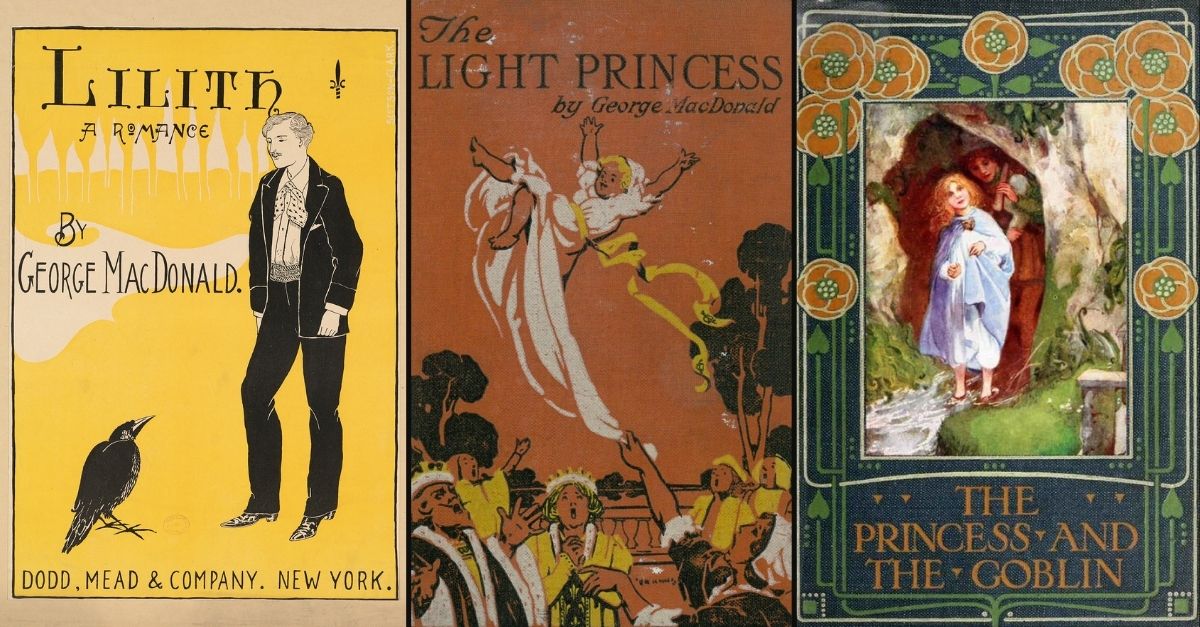
10 Great Books by George MacDonald
MacDonald wrote various other works along with the novels and nonfiction mentioned above. Here are 10 of his books worth reading, from his fairy tales to his study of Hamlet:
5. At the Back of the North Wind
6. A Hidden Life and Other Poems
7. The Princess and the Goblin
8. Sir Gibbie
9. Phantastes
10. The Tragedie of Hamlet, Prince of Denmark
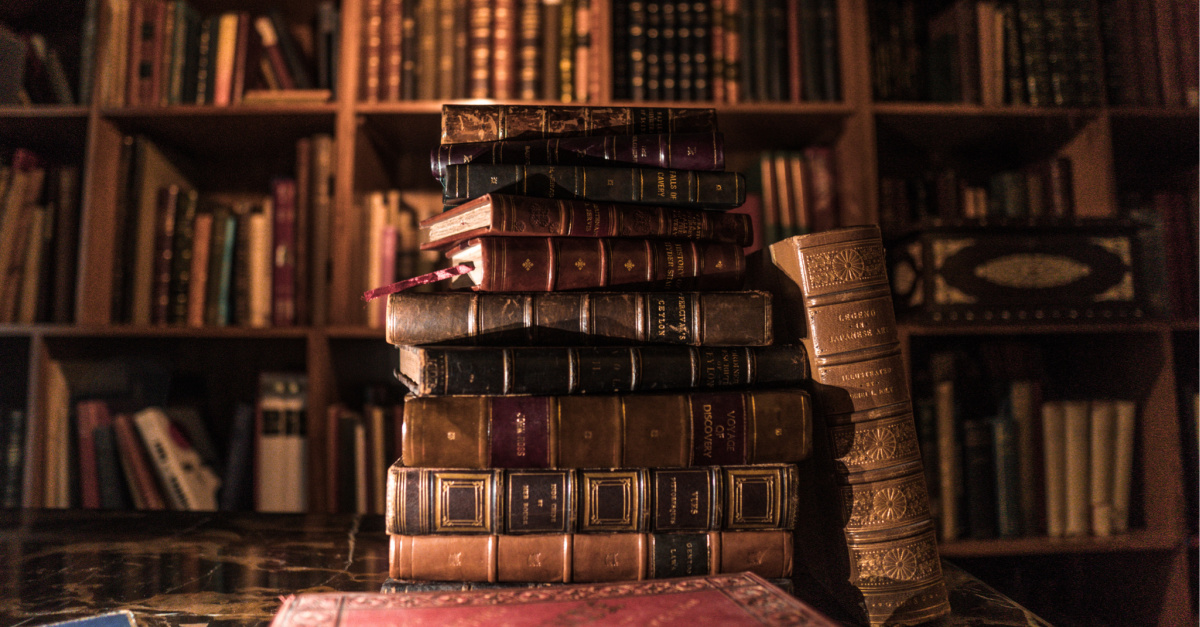
10 Books about George MacDonald
If you’re seeking books to read more about MacDonald’s life and work, these books are well worth checking out:
1. The Gospel in George MacDonald edited by Marianne Wright
2. A Novel Pulpit by David L. Neuhouser
3. George MacDonald: An Anthology by C.S. Lewis
4. George MacDonald and His Wife by Greville MacDonald
5. George MacDonald: Victorian Mythmaker by Rolland Hein
6. Informing the Inklings: George MacDonald and the Victorian Roots of Modern Fantasy edited by Michael Partridge and Kirstin Jeffrey John
7. George MacDonald’s Children’s Fantasies and the Divine Imagination by Colin N. Manlove
8. 3,000 Quotations from the Writings of George MacDonald edited by Harry Verploegh
9. Far Above Rubies: The Life of Louisa MacDonald by Jolyn Canty
10. The Theology of George MacDonald by John R. de Jong
You may also enjoy The Fantasy Makers, a documentary examining MacDonald and later Christian fantasy writers he influenced.
Cover Photo Credit: Public domain photo by Elliott & Fry.

Originally published July 28, 2022.





